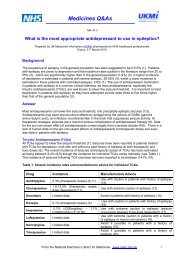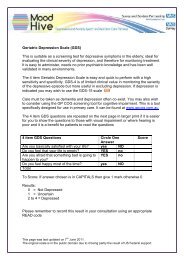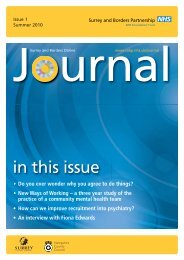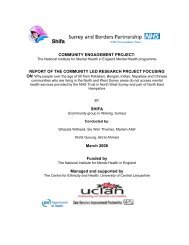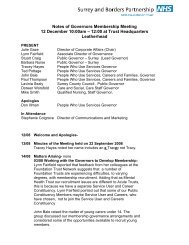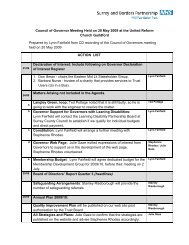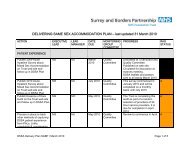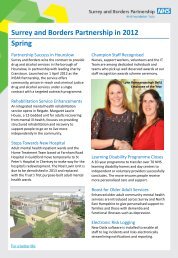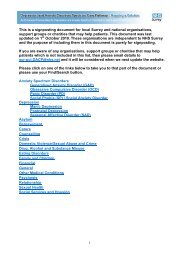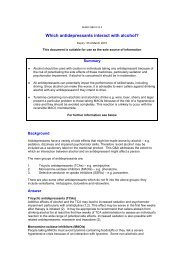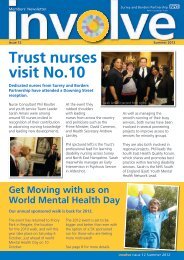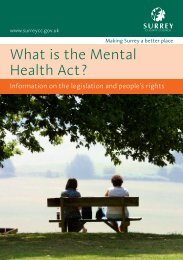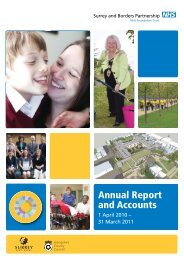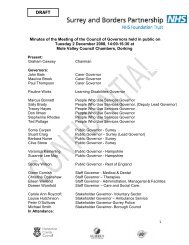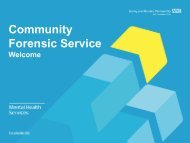DVLA "at a glance" fitness to drive - Heart Rhythm UK
DVLA "at a glance" fitness to drive - Heart Rhythm UK
DVLA "at a glance" fitness to drive - Heart Rhythm UK
You also want an ePaper? Increase the reach of your titles
YUMPU automatically turns print PDFs into web optimized ePapers that Google loves.
-The applicant or licence holder must notify <strong>DVLA</strong> unless st<strong>at</strong>ed otherwise in the text<br />
PSYCHIATRIC DISORDERS<br />
HYPOMANIA/MANIA<br />
NB: For cases, which also involve<br />
persistent misuse of or dependency<br />
on alcohol/drugs, please refer <strong>to</strong> the<br />
appropri<strong>at</strong>e section of Chapter 5.<br />
Where psychi<strong>at</strong>ric illness has been<br />
associ<strong>at</strong>ed with substance misuse,<br />
continuing misuse is not acceptable<br />
for licensing.<br />
GROUP 1 ENTITLEMENT<br />
ODL - CAR, M/CYCLE<br />
Driving must cease during the<br />
acute illness. Following an isol<strong>at</strong>ed<br />
episode, re-licensing can be<br />
reconsidered when all the following<br />
conditions can be s<strong>at</strong>isfied:<br />
(a) Has remained well and stable<br />
for <strong>at</strong> least 3 months.<br />
(b) Is compliant with tre<strong>at</strong>ment.<br />
(c) Has regained insight.<br />
(d) Is free from adverse effects of<br />
medic<strong>at</strong>ion which would impair<br />
driving.<br />
(e) Subject <strong>to</strong> a favourable<br />
specialist report.<br />
REPEATED CHANGES OF<br />
MOOD: Hypomania or mania are<br />
particularly dangerous <strong>to</strong> driving<br />
when there are repe<strong>at</strong>ed changes of<br />
mood. Therefore, when there have<br />
been 4 or more episodes of mood<br />
swing within the previous 12<br />
months, <strong>at</strong> least 6 months stability<br />
will be required under condition (a),<br />
in addition <strong>to</strong> s<strong>at</strong>isfying conditions<br />
(b) <strong>to</strong> (e).<br />
GROUP 2 ENTITLEMENT<br />
VOC – LGV/PCV<br />
Driving must cease pending the<br />
outcome of medical enquiry. It is<br />
normally a requirement th<strong>at</strong> the person<br />
should be well and stable for 3 years<br />
(i.e. <strong>to</strong> have experienced a good level of<br />
functional recovery with insight in<strong>to</strong><br />
their illness and <strong>to</strong> be fully adherent <strong>to</strong><br />
the agreed tre<strong>at</strong>ment plan, including<br />
engagement with the medical services)<br />
before driving can be resumed. In line<br />
with good practice, <strong>at</strong>tempts should be<br />
made <strong>to</strong> achieve the minimum effective<br />
dose of psychotropic medic<strong>at</strong>ion;<br />
<strong>to</strong>lerability should be optimal and not<br />
associ<strong>at</strong>ed with any deficits (e.g. in<br />
alertness, concentr<strong>at</strong>ion and mo<strong>to</strong>r<br />
performance) th<strong>at</strong> might impair driving<br />
ability. Where in p<strong>at</strong>ients with<br />
established illness the his<strong>to</strong>ry suggests a<br />
likelihood of relapse, the risk should be<br />
appraised as low (either in the tre<strong>at</strong>ed or<br />
untre<strong>at</strong>ed st<strong>at</strong>e). <strong>DVLA</strong> will normally<br />
require a consultant report th<strong>at</strong><br />
specifically addresses the relevant<br />
issues above before the licence can be<br />
considered.<br />
CHRONIC SCHIZOPHRENIA &<br />
Other Chronic Psychoses<br />
NB: For cases, which also involve<br />
persistent misuse of or dependency<br />
on alcohol/drugs, please refer <strong>to</strong> the<br />
appropri<strong>at</strong>e section of Chapter 5.<br />
Where psychi<strong>at</strong>ric illness has been<br />
associ<strong>at</strong>ed with substance misuse,<br />
continuing misuse is not acceptable<br />
for licensing.<br />
The <strong>drive</strong>r must s<strong>at</strong>isfy all the<br />
following conditions:<br />
(a) Stable behaviour for <strong>at</strong> least 3<br />
months.<br />
(b) Is adequ<strong>at</strong>ely compliant with<br />
tre<strong>at</strong>ment.<br />
(c) Remain free from adverse<br />
effects of medic<strong>at</strong>ion, which<br />
would impair driving.<br />
(d) Subject <strong>to</strong> a favourable<br />
specialist report.<br />
Continuing symp<strong>to</strong>ms: Even with<br />
limited insight, these do not<br />
necessarily preclude licensing.<br />
Symp<strong>to</strong>ms should be unlikely <strong>to</strong><br />
cause significant concentr<strong>at</strong>ion<br />
problems, memory impairment or<br />
distraction whilst driving.<br />
Particularly dangerous, are those<br />
<strong>drive</strong>rs whose psychotic symp<strong>to</strong>ms<br />
rel<strong>at</strong>e <strong>to</strong> other road users.<br />
Driving must cease pending the<br />
outcome of medical enquiry. It is<br />
normally a requirement th<strong>at</strong> the person<br />
should be well and stable for 3 years<br />
(i.e. <strong>to</strong> have experienced a good level of<br />
functional recovery with insight in<strong>to</strong><br />
their illness and <strong>to</strong> be fully adherent <strong>to</strong><br />
the agreed tre<strong>at</strong>ment plan, including<br />
engagement with the medical services)<br />
before driving can be resumed. In line<br />
with good practice, <strong>at</strong>tempts should be<br />
made <strong>to</strong> achieve the minimum effective<br />
anti-psychotic dose; <strong>to</strong>lerability should<br />
be optimal and not associ<strong>at</strong>ed with any<br />
deficits (e.g. in alertness, concentr<strong>at</strong>ion<br />
and mo<strong>to</strong>r performance) th<strong>at</strong> might<br />
impair driving ability. Where in p<strong>at</strong>ients<br />
with established illness the his<strong>to</strong>ry<br />
suggests a likelihood of relapse, the risk<br />
should be appraised as low (either in the<br />
tre<strong>at</strong>ed or untre<strong>at</strong>ed st<strong>at</strong>e). <strong>DVLA</strong> will<br />
normally require a consultant report th<strong>at</strong><br />
specifically addresses the relevant<br />
issues above before the licence can be<br />
considered.<br />
See Appendix <strong>at</strong> end of this Chapter<br />
32



